As loving pet parents, we want to share everything with our furry companions, including our food. However, many common human foods that are perfectly safe, or even healthy, for us can be toxic or incredibly harmful to dogs. Understanding what foods are not good for dogs’ digestion is crucial to preventing accidental poisonings, which sadly affect hundreds of thousands of pets annually in the United States alone. This guide aims to be your essential resource, helping you navigate the culinary landscape to keep your canine friend safe and healthy.
Dogs’ digestive systems and metabolism differ significantly from ours, meaning they process certain substances very differently. For instance, compounds like theobromine in chocolate are metabolized much slower in dogs, leading to rapid buildup and potentially fatal consequences. Similarly, while we can enjoy cherries, their pits, stems, and leaves contain cyanide, which can cause serious issues if ingested in large quantities by dogs. Beyond immediate toxicity, factors like your dog’s size, breed, and existing health conditions can influence their reaction to certain foods. Therefore, arming yourself with knowledge about these dangerous items is paramount. For a positive contrast, learn more about what are the best foods for dogs to eat.
Why Certain Foods Pose a Risk to Dogs’ Digestive Systems
The fundamental reason many human foods are dangerous for dogs lies in the vast differences between canine and human physiology. Our bodies are equipped to handle certain compounds and nutritional profiles that a dog’s body simply isn’t. This metabolic disparity means that what might be a harmless snack for you could become a life-threatening emergency for your pet.
Take the example of chocolate, a well-known culprit. It contains theobromine and caffeine, both methylxanthines. Humans metabolize these substances relatively quickly, but dogs process them much slower. This slow metabolism allows the toxins to accumulate in their system to dangerous levels, leading to a range of symptoms from gastrointestinal upset to seizures and even death. Another common issue arises from the physical structure of certain foods. For instance, the pits of fruits like cherries contain cyanide, and while the fleshy part might be safe, the pit itself can also cause digestive obstruction, leading to severe discomfort and other complications.
Furthermore, a dog’s vulnerability to food toxicity can be influenced by several individual factors. Smaller breeds, for example, are generally more susceptible to the effects of toxins due to their lower body weight, which means a smaller amount of a harmful substance can have a more concentrated and severe impact. Puppies and elderly dogs also face higher risks because their digestive and immune systems may be less developed or compromised, making them more vulnerable to adverse reactions. Dogs with pre-existing conditions like diabetes or kidney disease are also at greater risk, as certain foods can exacerbate these health issues. It’s always best to consult your veterinarian if you have any questions or concerns about specific foods and your dog’s health.
Dangerous Foods for Dogs’ Digestion: A Detailed List to Avoid
Many common household foods are dangerous, and often toxic, to dogs. Some of the most frequently encountered culprits include alcohol, avocados, macadamia nuts, grapes, raisins, xylitol, and chocolate. This comprehensive list highlights the foods your dog should absolutely avoid to safeguard their health and digestive well-being.
Alcohol
Alcohol, in any form, is highly dangerous for dogs. Due to their smaller size, even minimal amounts can have severe and deadly effects. Symptoms of alcohol poisoning in dogs mirror those in humans, including vomiting, breathing difficulties, coma, and potentially death. It’s crucial to keep all alcoholic beverages, and products containing alcohol, completely out of your dog’s reach.
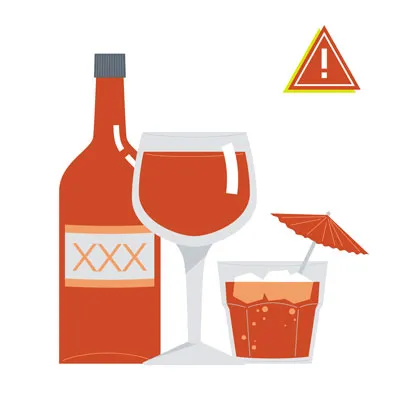 Dog looking at a glass of alcohol on a table
Dog looking at a glass of alcohol on a table
Fruit Seeds and Pits (Apples, Apricots, Cherries, Plums, Peaches)
While the fleshy parts of apples are safe (without the core and seeds), the core and seeds are not. Apple seeds contain cyanide, and though small amounts may be tolerated, it’s best to avoid them entirely. Similarly, apricot, cherry, peach, and plum seeds and pits also contain cyanide, which can cause vomiting, irregular heartbeats, seizures, coma, and even death by preventing red blood cells from carrying oxygen effectively. These pits also pose a choking hazard and can cause gastrointestinal obstruction.
Avocado
Avocados are not a good choice for dogs. They contain a fungicidal toxin called persin, which can cause vomiting and diarrhea in dogs in large quantities. More critically, the large pit of an avocado can cause a severe gastrointestinal obstruction if swallowed. It’s safest to keep avocados away from your pet.
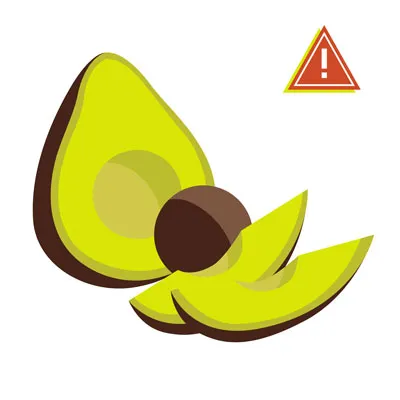 Whole avocado and sliced avocado with a spoon
Whole avocado and sliced avocado with a spoon
Broccoli
Broccoli contains isothiocyanates, which can be harmful to dogs in very large doses. While tiny amounts might be occasionally tolerated, it’s generally best to avoid feeding broccoli due to the availability of many healthier and safer vegetable options. The stalks can also pose a choking risk or cause an obstruction in a dog’s throat.
Caffeine and Coffee Grounds
Caffeine, found in coffee, tea, energy drinks, and some medications, contains methylxanthines. These stimulants can cause a range of severe symptoms in dogs, including potentially fatal diarrhea, vomiting, seizures, and irregular heartbeats. Accidental ingestion of coffee grounds or highly caffeinated beverages can lead to a racing heart, tremors, arrhythmia, and difficulty breathing.
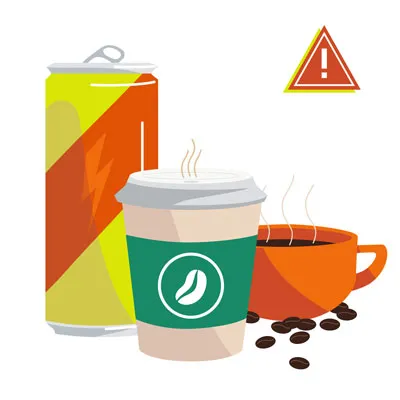 Coffee beans and coffee grounds in a bowl
Coffee beans and coffee grounds in a bowl
Fatty Meats, Skin, and Bones (Chicken, Turkey, Ham)
Fatty cuts of meat, such as ham, chicken skin, and turkey skin, should be avoided. Their high-fat content can trigger acute pancreatitis in dogs, a life-threatening illness with serious complications. Furthermore, cooked bones from chicken or turkey are extremely dangerous. They can splinter, causing internal damage, obstructions in the bowels, or even puncturing the stomach or intestines, potentially leading to fatal abdominal infections. For safer protein sources, consider what meat should never be given to dogs.
Chocolate
Chocolate toxicity is one of the most common causes of pet poisoning. All chocolate products contain theobromine, a compound dogs cannot metabolize efficiently. The darker the chocolate, the higher the concentration of theobromine, making dark chocolate and baker’s chocolate particularly dangerous. Chocolate also contains caffeine, and some sugar-free varieties may contain xylitol, both of which are toxic to dogs. Symptoms can include hyperactivity, vomiting, diarrhea, pancreatitis, abnormal heart rhythm, and seizures. If your dog ingests any amount of chocolate, contact your vet immediately.
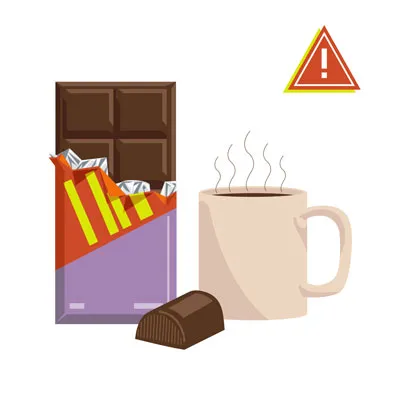 Pieces of dark chocolate and chocolate chips
Pieces of dark chocolate and chocolate chips
Grapes and Raisins
Grapes and raisins are highly dangerous for dogs and can cause severe problems like acute kidney failure due to the tartaric acid they contain. Even a small number of grapes or raisins can wreak havoc on a dog’s kidneys. Symptoms of poisoning include vomiting, diarrhea, loss of appetite, changes in urine output, or an inability to urinate.
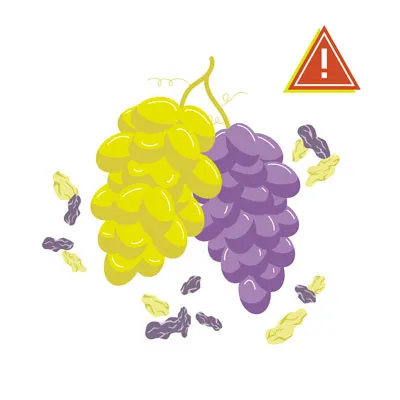 Red and green grapes in a bowl
Red and green grapes in a bowl
Macadamia Nuts, Almonds, and Pistachios
Macadamia nuts are toxic to dogs and can cause numerous painful symptoms, including weakness, overheating, and vomiting. The exact mechanism of toxicity is still a mystery, but as few as six nuts can cause severe poisoning in a small dog. While other nuts like almonds and pistachios are not as toxic, they can be choking hazards, especially if flavored or spiced, and their high-fat content can lead to pancreatitis.
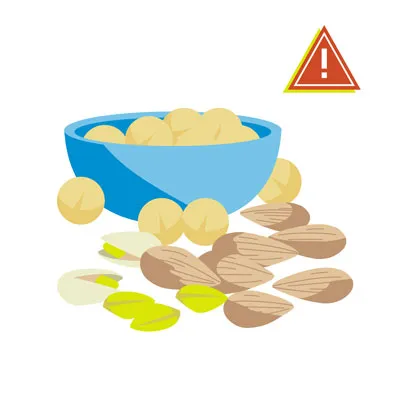 Macadamia nuts in their shells and shelled
Macadamia nuts in their shells and shelled
Milk and Dairy Products
The ability of dogs to digest milk and dairy products varies greatly. Many dogs are lactose intolerant or allergic, and consuming cow’s milk or other dairy can lead to diarrhea and gas. While small quantities of low-fat cheese might be acceptable as an occasional treat, high-fat cheeses and ice cream should be avoided due to their sugar and fat content, which can cause digestive upset or pancreatitis.
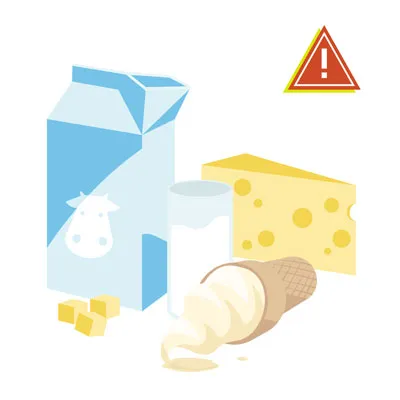 Glass of milk with a carton of milk in the background
Glass of milk with a carton of milk in the background
Mushrooms
It is generally best to err on the side of caution and avoid feeding your dog any mushrooms, especially wild varieties. Many types of mushrooms contain various toxins that can lead to kidney and liver failure, vomiting, diarrhea, hallucinations, and damage to red blood cells. While commercially grown white button mushrooms might be considered safe after thorough washing, it is usually safer to choose other treats.
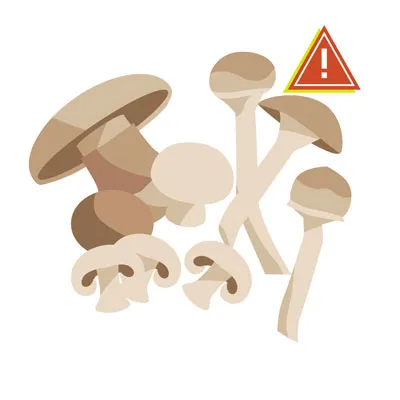 Assortment of mushrooms, some wild, some cultivated
Assortment of mushrooms, some wild, some cultivated
Nutmeg and Cinnamon
Nutmeg contains myristicin, a compound that can cause hallucinations and severe vomiting in dogs, especially in high doses or for smaller dogs. Cinnamon is not toxic, but it can irritate a dog’s mouth and, in some cases, lead to low blood sugar, which can have serious health implications. It’s advisable to keep both spices away from your dog.
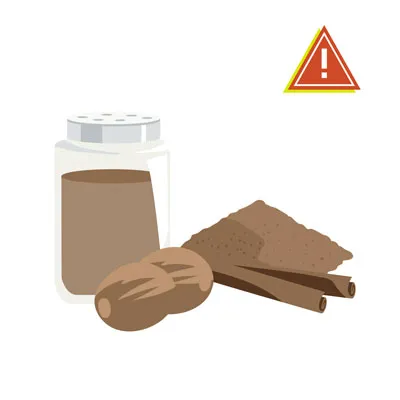 Nutmeg and cinnamon sticks on a wooden surface
Nutmeg and cinnamon sticks on a wooden surface
Onions, Garlic, Chives, and Leeks (Allium Family)
All members of the Allium family, including onions, garlic, chives, and leeks, are highly dangerous for dogs. They contain sulfoxides and disulfides, compounds that can damage red blood cells and cause anemia. This damage can be potentially fatal. Onion and garlic powders, found in many processed human foods, are equally toxic. Certain Japanese breeds, such as Akitas and Shiba Inus, are particularly sensitive, but these plants are harmful to all dogs.
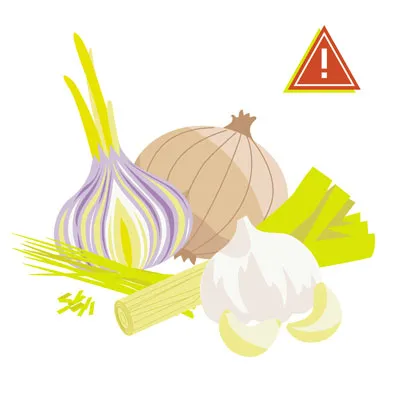 Onions, garlic cloves, chives, and leeks
Onions, garlic cloves, chives, and leeks
Salt
Excessive amounts of salt can disrupt the fluid balance in a dog’s cells, leading to sodium ion poisoning. Symptoms can include tremors, seizures, diarrhea, vomiting, and even coma. Avoid feeding your dog salty foods like potato chips, pretzels, or even letting them ingest rock salt or homemade play dough, which often contains high levels of salt.
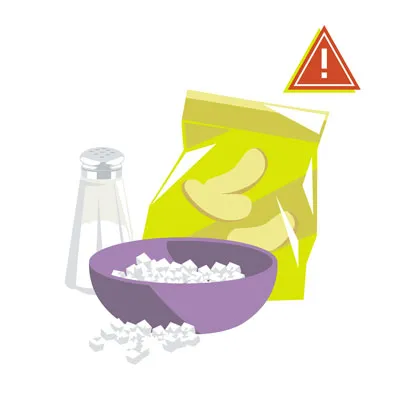 Pile of salt crystals
Pile of salt crystals
Spicy Food
Spicy foods are generally not good for dogs’ digestion. Ingredients like chili peppers can cause severe gastrointestinal upset, leading to vomiting, stomach ulcers, diarrhea, and significant pain for your dog. These symptoms often require veterinary attention, which can be costly.
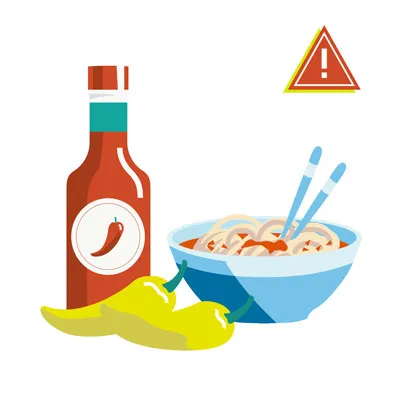 Red chili peppers and dried spices
Red chili peppers and dried spices
Sugar-Free Gum and Candy (Xylitol)
Xylitol is an artificial sweetener found in many sugar-free human products, including gum, candies, baked goods, and even some toothpastes. In dogs, xylitol causes a rapid and severe drop in blood sugar (hypoglycemia), leading to weakness, loss of coordination, and potentially seizures. It can also cause liver failure. Dog poisoning cases involving xylitol are on the rise, and a small amount, like that in just five pieces of gum, can be fatal to a 65-pound dog.
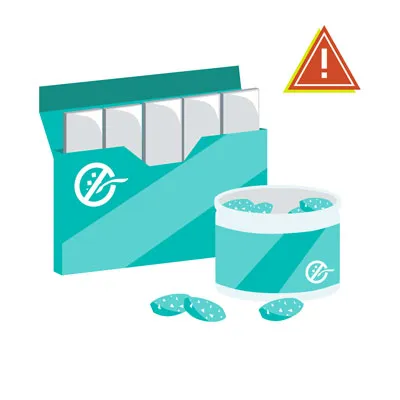 Sugar-free gum and candy pieces
Sugar-free gum and candy pieces
Tomatoes and Raw Potatoes
Tomatoes and potatoes fall into a category where some forms are safe, while others are toxic. A ripened red tomato is generally considered safe in moderation. However, the green parts of the tomato plant, including stems, leaves, and unripe green tomatoes, contain solanine, which is toxic to dogs. Similarly, cooked potatoes without additives are generally safe in small amounts, but raw potatoes also contain solanine and should be avoided.
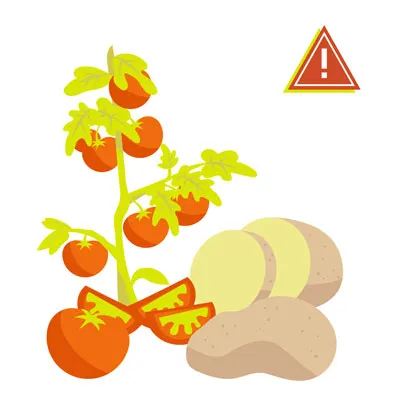 Ripe red tomatoes and raw potatoes
Ripe red tomatoes and raw potatoes
Tobacco
Tobacco products, regardless of their form (cigarettes, cigars, e-liquids, chewing tobacco), are highly dangerous for dogs due to their nicotine content. Exposure can cause a range of symptoms, including vomiting, diarrhea, rapid breathing, agitation, abnormal heart rate, wobbliness, muscle weakness, and seizures. More severe exposure can lead to blue gums, coma, and can be fatal. Dogs are naturally curious and may ingest discarded tobacco products, requiring immediate veterinary intervention.
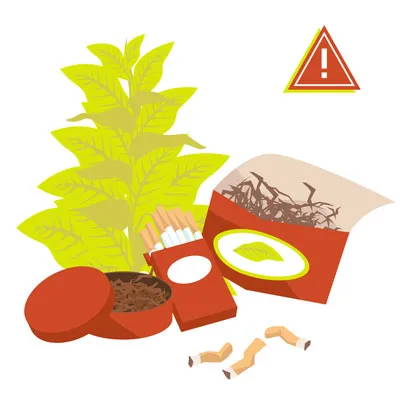 Cigarettes and tobacco leaves
Cigarettes and tobacco leaves
Yeast and Raw Dough
Yeast and raw dough are exceptionally unsafe for dogs. Raw dough can expand significantly in a dog’s warm stomach, causing severe pain, bloating, and potentially life-threatening conditions like gastric torsion or rupture of the stomach. Additionally, the yeast and sugar in raw dough ferment, producing alcohol, which can lead to alcohol toxicity. This dual threat requires immediate medical attention if ingested.
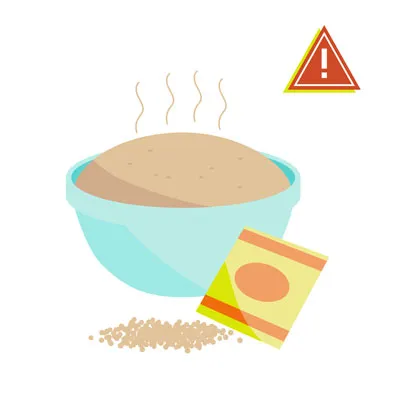 Raw dough in a bowl with yeast nearby
Raw dough in a bowl with yeast nearby
Raw Meat
Feeding your dog raw or undercooked meat is highly discouraged due to the risk of bacterial contamination from Salmonella or E. coli, which can affect both dogs and humans. Furthermore, raw bones can pose a choking hazard or cause internal injuries to your dog’s digestive tract. Always ensure any meat given to your dog is thoroughly cooked and boneless.
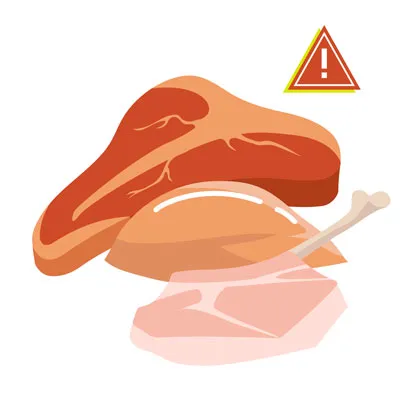 Raw meat on a cutting board
Raw meat on a cutting board
Rhubarb
Rhubarb, commonly used in desserts, is not safe for pets. Its leaves contain soluble calcium oxalate crystals. If ingested in sufficient quantities, these crystals can bind with calcium in your dog’s body, causing a dangerous drop in calcium levels and potentially leading to renal failure. Symptoms include tremors, weakness, drooling, bloody urine, and changes in thirst and urination.
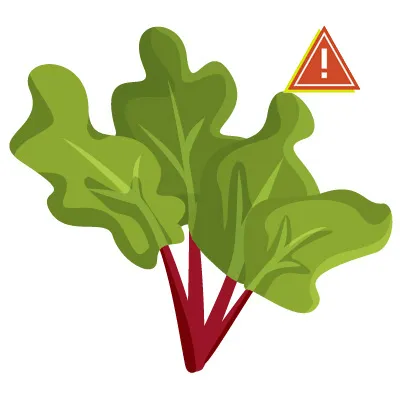 Rhubarb stalks and leaves
Rhubarb stalks and leaves
Star Fruit
Similar to rhubarb, star fruit also contains soluble calcium oxalate crystals, making it unsafe for dogs. Avoid letting your dog snack on this fruit.
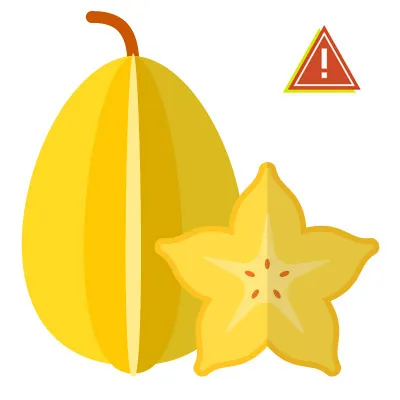 Sliced star fruit
Sliced star fruit
Flavored Water and Seltzer Water
It’s always best to provide your dog with fresh, clean, plain water. Flavored or carbonated waters can contain added sugars, salts, or artificial sweeteners (like xylitol), all of which can be dangerous for dogs. Plain seltzer water might be tolerated in very small amounts in an emergency, but it can cause gas and bloating. Sticking to regular water is the safest choice.
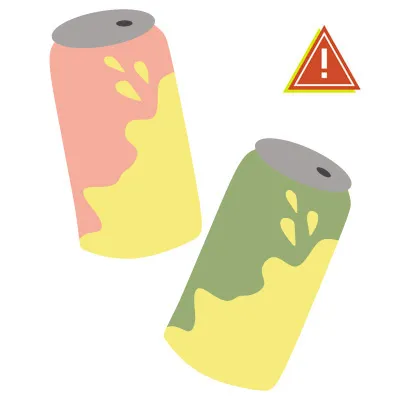 Glass of seltzer water with lime
Glass of seltzer water with lime
Safe Human Foods for Dogs
While the list of dangerous foods for dogs is extensive, there are also many human foods that your dog can safely enjoy as occasional treats. These include apples (without core and seeds), bananas (without peel), blueberries, carrots, celery, cucumbers, fully cooked eggs, green beans, and plain, air-popped popcorn (unsalted, unbuttered). Remember that moderation is key, and even safe foods should be offered in small, appropriate portions. For more options, explore what human foods are healthy for dogs.
Dogs Most at Risk from Toxic Foods
While it’s imperative to prevent any dog from ingesting toxic foods, certain dogs are at a higher risk of severe reactions:
- Small Breeds: Due to their lower body weight, smaller dogs are more vulnerable to toxins, as the harmful substances become more concentrated in their system.
- Puppies: Young dogs have less developed digestive and immune systems, making them more susceptible to the adverse effects of certain substances.
- Elderly Dogs: Older dogs may have compromised health or existing medical conditions that increase their risk when exposed to toxic foods.
- Dogs with Pre-existing Conditions: Dogs suffering from conditions like diabetes, kidney disease, or pancreatitis are at greater risk, as certain foods can exacerbate their health problems.
Preventing Your Dog from Eating Harmful Foods
Accidents can happen, but proactive measures can significantly minimize the risk of your beloved pup encountering unsafe human food.
Store Foods Out of Reach
The simplest and most effective prevention is to keep all dangerous foods on high shelves, in locked cabinets, or in secure containers that your dog cannot access. Remember that curious dogs can be surprisingly resourceful.
Avoid Feeding Dogs from Your Plate
Resist the urge to feed your dog scraps from your plate or while you’re cooking in the kitchen. This teaches them to beg for human food, increasing the chance of accidental ingestion of something harmful. It is safest to only give treats specifically formulated for dogs.
Educate Family Members and Guests
Ensure everyone in your household, including children, and any guests are aware of the foods dangerous to dogs. Emphasize that no matter how tempting it is, they should never secretly feed your dog human food.
Be Careful During Holidays
Holidays often involve an abundance of rich foods and a relaxed atmosphere, which can increase the risk of accidental exposure. Be extra vigilant during these times to keep all potentially toxic foods, especially chocolate and fatty meats, away from your pet. Always have contact information for emergency veterinarians or poison control readily available.
What to Do if Your Dog Consumes Toxic Food
If your dog eats something toxic, immediate action is crucial. Time is of the essence, as prompt treatment often leads to better outcomes and shorter recovery times.
First, familiarize yourself with the common symptoms of food toxicity. These can vary depending on the substance ingested but often include listlessness, distress, pain, vomiting, diarrhea, bloody stools, and a bloated or hard stomach. If you observe any of these signs, particularly after suspecting ingestion of a dangerous food, do the following:
- Call Your Veterinarian or Poison Control Immediately: Do not delay. Provide them with as much information as possible, including the type of food eaten, the estimated amount consumed, and the time of ingestion.
- Avoid Home Remedies Unless Advised: Do not attempt to induce vomiting or administer any home remedies without explicit instructions from your veterinarian or poison control. What might be helpful for one toxin could be harmful for another.
Remember, your vigilance and quick response can be the difference between a minor incident and a life-threatening emergency.
Protecting Your Dog’s Digestive Health
Navigating the world of human foods and their potential impact on your dog’s digestion can be challenging. From common household toxins to specific foods that are not good for dogs’ digestion, keeping track requires careful attention. However, by understanding these risks and implementing preventative measures, you can significantly safeguard your dog’s health.
Focus on providing your dog with a balanced, dog-appropriate diet and safe, healthy treats. Always consult your veterinarian if you are unsure about any food item or if you suspect your dog has ingested something harmful. Proactive care and informed decisions are key to ensuring your beloved companion lives a long, healthy, and happy life.
